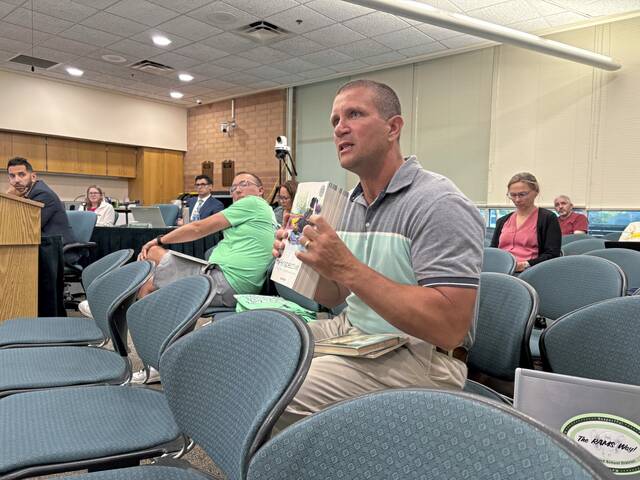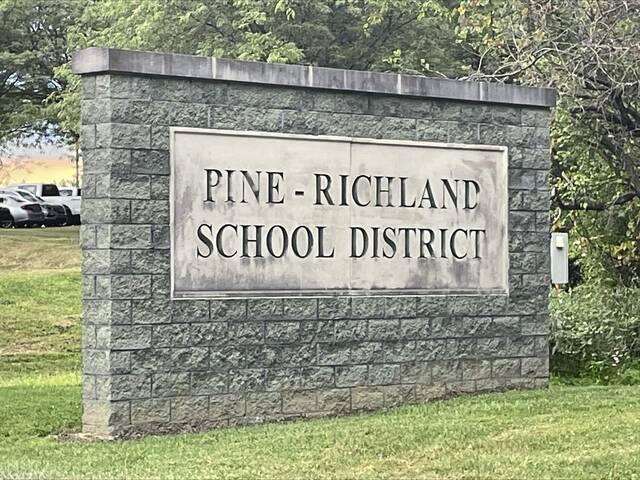The 1960 novel “To Kill a Mockingbird” will be available for Pine-Richland High School’s English teachers to use in ninth grade classes, but they won’t be assured of reading it.
After lengthy discussions over multiple meetings, the school board voted 6-2 on Aug. 11 to approve curriculum for academic English 9 that keeps the Harper Lee novel as a secondary resource.
It also approved the curriculum for honors English 9, in which the novel is a primary resource.
Board member Christina Brussalis had argued for “To Kill a Mockingbird” to be a primary resource in academic English 9, ensuring that all students in the course would read it. She and board President Philip Morrissette voted against; Vice President Lisa Hillman was absent.
During the 2024-25 school year, “To Kill a Mockingbird” was not read in any of the six sections of academic English 9. However, it was read in all sections of honors English 9, according to the district.
“We haven’t taught it for quite some time even when it was in our curriculum,” Brussalis said. “When we gave choice about it, it wasn’t taught at all. That concerns me because of probably all of the books in our curriculum, ‘To Kill a Mockingbird’ is probably the most important novel.
“It is America’s favorite novel,” she said. “The fact that we are not teaching it is a disservice to our students.”
A program review in 2019-20 that began being implemented in 2020 included wanting to engage students, said Kristen Justus, assistant superintendent of elementary education. “To Kill a Mockingbird” became an honors resource because it’s more rigorous.
“We were not measuring who was using what book because we made it an ‘or,’ ” she said. “We understood that the rigor should live in the honors course and that it probably wasn’t for the majority of our academic students. They wouldn’t come to school excited about reading that book, but we had other ways to get at the learning goals to help them master it.”
As approved, the academic English 9 primary resources are the “myPerspectives” textbook, “A Separate Peace,” “The Tragedy of Romeo and Juliet” and excerpts from “The Odyssey.” The only other specific secondary resource is “A Tale of Two Cities.”
Following a discussion between the board and administrators in July, administrators explained to the board how making “To Kill a Mockingbird” a primary resource would impact the curriculum prepared by teachers.
Those impacts included reducing the amount of time to expose students to a wide variety of texts and themes, “The Odyssey” likely becoming the only poem taught in a unit, removal of a formal research project and library usage, a decrease in other genres and text selections, and a decrease in preparation activities for the Keystone exam.
“To Kill a Mockingbird” usually requires 40 days to teach, the presentation said. To teach it with related nonfiction texts, teachers would add 10 more days to the unit in which it would have been taught.
Including the novel would increase classical literature. It also would align with nonfiction text selections and with ninth grade U.S. history.
Michael Pasquinelli, assistant superintendent of secondary education who made the presentation, stressed that they value classical literature.
“We also value some different genres for our students to experience in their classes. We think there’s value in that,” he said. “We also understand the teachers really understand the students that they’ve been working with for years. There is a different learner between an academic and an honors student, and the readiness and the different genres that they put in front of them matter, how they interact with those texts matter, what those learning activities look like in the classroom matter. All of those things are considered when we put the curriculum together.”
High school Principal Frank Hernandez said he worried about losing time to prepare students for Keystone exams, particularly in poetry, an area where students had underperformed the state.
Pasquinelli said he respects the board’s oversight role, while also saying there is value in allowing teachers some discretion on what resources they use.
“At some point, I’d love to tell our English 9 teachers that we’re ready to focus on learning, go with your curriculum, use the resources that we highly recommend, but there is some level of discretion,” he said.
Superintendent Brian Miller expressed concern about the time the school board spent on the issue and urged the board to approve the curriculum the teachers developed.
“We have significant challenges in front of us, far more than a particular book in a particular grade level,” he said. “I want our time in these meetings … to be squarely focused on what is the budgetary structural challenge facing our district, how are we going to consider all aspects of expenditure and what we anticipate with revenue, how are we going to make decisions that preserve the quality of our programs across the board inside and outside the classroom. I want our time to be spent there.”
With teachers and students soon returning to school, board members Ashley Fortier and Amy Terchick called on the board to approve the curriculum as prepared by teachers, with Terchick suggesting that there be further talks with teachers about “To Kill a Mockingbird” through the coming school year with an eye toward the 2026-27 school year.
Hernandez suggested the same. Board member Marc Casciani also wants that discussion to take place.
“It is a book every kid should be exposed to,” he said.








